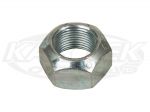Matt Crawley
Husqvarna
AA Class
Hey Everybody.
I'm putting in a new sprocket and the stock nuts/bolts proved quite difficult to tighten.
I have an electric impact wrench that drives at roughly 50/100/200 lbft and it could not tighten the bolts enough to eliminate play at the 100 lbft setting. It drove them tight with the 200 lbft setting but then the last bolt I tightened snapped.
I couldn't find a torque spec in the Workshop Manual. Any thoughts from the group on this?
Thanks,
Matt
I'm putting in a new sprocket and the stock nuts/bolts proved quite difficult to tighten.
I have an electric impact wrench that drives at roughly 50/100/200 lbft and it could not tighten the bolts enough to eliminate play at the 100 lbft setting. It drove them tight with the 200 lbft setting but then the last bolt I tightened snapped.
I couldn't find a torque spec in the Workshop Manual. Any thoughts from the group on this?
Thanks,
Matt







